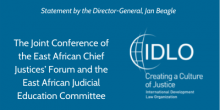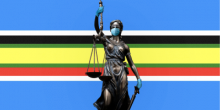Rwanda_Hotel Accommodation and Conference Services ITB No. N-126-2024-RWA-ITB
Framework Agreements for the provision of Hotel Accommodation and Conference Services in various locations in Rwanda.

Since the genocide of 1994, where approximately one million people perished, Rwanda has made tremendous progress in many areas of social welfare. The country is one of the most noted examples, both globally and on the African continent, of fast economic growth and successful post-war reconstruction. Significant development successes over the last decade include high economic growth, rapid poverty reduction and, since 2005, reduced inequality. In addition to this, the country strives for strong political stability, as reflected in the adoption of a new Constitution in 2003. Rwanda is also known for having the highest female representation in Parliament compared to any other nation, with 64% of women in the Lower House.
IDLO is supporting the country’s progress by implementing a project aiming to strengthen the capacity of Rwandan defense lawyers in international criminal law, in order to provide them with stronger support for dealing with genocide court cases.
Framework Agreements for the provision of Hotel Accommodation and Conference Services in various locations in Rwanda.
Framework Agreements for the provision of Road Passenger Transport Services in Rwanda.
Statement by the Director-General, Jan Beagle at the Joint Conference of the East African Chief Justices’ Forum and the East African Judicial Education Committee
Honourable Chief Justices,
Members of the East African Judiciaries,
Distinguished Guests,

EVENT | 10-12 May | Kigali, Rwanda

Paralegal networks play a critical role in establishing a link between the informal and formal justice systems in the East and Horn of Africa.

REGIONAL WEBINAR
Access to Justice in the Context of COVID-19 in East Africa: Experiences from Kenya, Uganda, Tanzania and Rwanda

East Africa Regional Forum - Alternative Dispute Resolution & Customary and Informal Justice: Advancing SDG16 and Pathways to Justice

Strengthening the capacity of prosecutors, judges and lawyers in Rwanda in international criminal law is both important and timely. Over two decades after Rwanda’s genocide, the number of cases extradited and transferred from other countries to Rwanda continues to increase. Given that international criminal law is a complex and evolving field, prosecutors who appear in Transfer cases would benefit from skills allowing them to more accurately and effectively research and apply the latest judicial precedents.



|
Publication
|
|
Policy Statements
|
|
Event
26 January, 2021 |